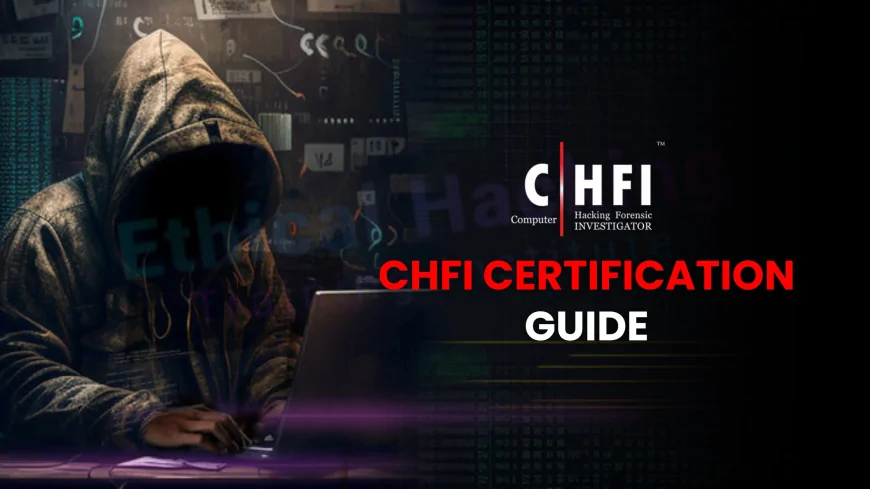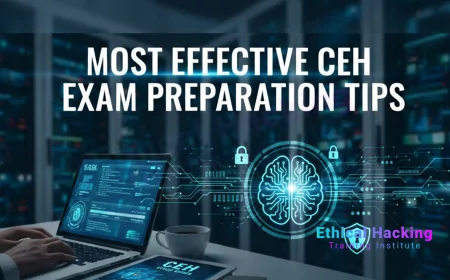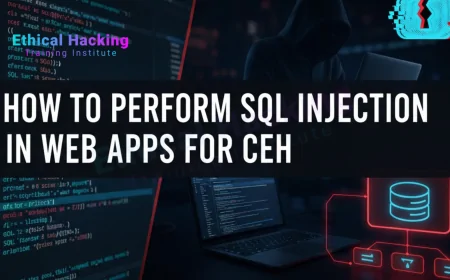Complete Guide to CHFI Training: Become an Expert in Computer Forensics | Master CHFI Certification: Full Training Guide for Aspiring Forensics Experts
Master CHFI training with hands-on labs, expert instruction, and real-world forensics skills. Become a certified computer forensic investigator today.

Table of Contents
- Introduction to CHFI
- What is CHFI Certification?
- Why Choose CHFI Training?
- Core Skills You’ll Gain
- Training Formats Explained
- Course Modules Overview
- Hands-On Labs & Tools
- CHFI Exam Preparation
- Career Paths After CHFI
- Industry Demand & Trends
- Eligibility & Prerequisites
- Choosing a Training Provider
- Cost Analysis & ROI
- Recertification & Continuing Education
- Case Studies & Success Stories
- Challenges and How to Overcome Them
- Top Tips for CHFI Success
- CHFI vs Other Forensics Certifications
- Future Scope of Computer Forensics
- 20 FAQs
- Conclusion
Introduction to CHFI
Computer Hacking Forensic Investigator (CHFI) is an EC-Council certification designed to validate your ability to investigate digital crimes, recover data, and prepare for legal proceedings.
What is CHFI Certification?
CHFI (Computer Hacking Forensic Investigator) is a globally recognized certification offered by the EC-Council that validates a professional’s expertise in identifying, investigating, and analyzing cybercrimes and digital security incidents.
CHFI at a Glance:
-
Full Form: Computer Hacking Forensic Investigator
-
Provided By: EC-Council (International cybersecurity certification authority)
-
Certification Code: EC0 312-49
-
Exam Duration: 4 hours
-
Questions: 150 multiple-choice
-
Validity: 3 years (renewable via EC-Council Continuing Education credits)
What Does CHFI Cover?
CHFI focuses on the forensic investigation process, which includes:
-
Identifying digital evidence
-
Preserving and recovering data (even deleted or encrypted)
-
Conducting system and network forensic analysis
-
Reconstructing events from logs and timestamps
-
Legal compliance, documentation, and chain-of-custody
-
Presenting findings for litigation or internal investigations
Who Should Pursue CHFI?
-
Security professionals involved in incident response and threat hunting
-
Law enforcement officers handling cybercrime
-
System administrators, IT managers, and legal professionals interested in cyber laws
-
Penetration testers and CEH-certified professionals expanding into defense and investigation
Why is CHFI Important?
Unlike offensive certifications (like CEH or OSCP), CHFI specializes in digital forensics—the legal and technical side of cybersecurity. It's crucial for:
-
Investigating breaches or insider threats
-
Collecting and preserving legally admissible evidence
-
Supporting criminal, civil, and corporate investigations
Summary:
CHFI certification empowers professionals to legally, ethically, and technically investigate digital crimes and cyber incidents, using cutting-edge forensic tools and methodologies.
Why Choose CHFI Training?
- Identify Cybercrime: Trace attackers, malware, and data theft.
- Recover Evidence: Restore deleted files, logs, and timestamps.
- Support Legal Cases: Present valid digital evidence in court.
- Compliance: Meet regulatory standards like GDPR, FISMA, and HIPAA.
Core Skills You’ll Gain
- Disk and mobile forensics
- File system analysis and registry forensics
- Memory analysis and network forensics
- Malware reverse engineering
- Timeline construction and chain-of-custody procedures
- Report writing and courtroom testimony
Training Formats Explained
- Instructor-Led Online: Live remote classes with Q&A sessions
- Self-Paced: Video modules and labs on your schedule
- Bootcamp: On-site immersive training (5–7 days intensives)
- Corporate: Customized for enterprise needs and team training
Course Modules Overview
- Introduction to computer forensics
- Digital evidence handling and chain of custody
- Operating system forensics (Windows, Linux, Mac)
- Network and cloud forensics
- Malware and memory analysis
- Creative forensics: Mobile, IoT, advanced scenarios
- Reporting, legal compliance, and data privacy
- Incident response and threat hunting
Hands-On Labs & Tools
Training includes real labs built on: EnCase, FTK, Autopsy, X-Ways, Volatility, Cellebrite, with practical exercises like image mounting, keyword searching, carving deleted files, memory dump analysis, network packet inspection, and malware dissection.
CHFI Exam Preparation
- Simulated practice tests and timed mock exams
- Key concept flashcards and mind‑maps
- Exam blueprint and domain-wise strategy
- Retake voucher and exam day support
Career Paths After CHFI
Earning the CHFI (Computer Hacking Forensic Investigator) certification opens doors to specialized roles in cybersecurity and digital forensics. As cybercrime continues to grow, organizations across government, corporate, and legal sectors increasingly seek professionals trained in incident investigation, data recovery, and evidence handling.
Top Career Roles for CHFI-Certified Professionals
1. Computer Forensics Analyst
-
Investigates digital crimes and system breaches
-
Recovers deleted, encrypted, or hidden data
-
Prepares forensic reports and works with law enforcement
2. Incident Response Specialist
-
First responder to security breaches
-
Performs root cause analysis and mitigates threats
-
Coordinates with SOC teams to document incidents
3. Digital Forensics Investigator
-
Conducts detailed investigations of compromised systems
-
Uses tools like EnCase, FTK, Autopsy, X-Ways
-
Presents digital evidence in legal or corporate contexts
4. eDiscovery Specialist
-
Manages electronic discovery for legal cases
-
Collects, processes, and analyzes data from multiple digital sources
-
Ensures evidence is forensically sound and legally admissible
5. Cybercrime Investigator
-
Works with law enforcement to track hackers, fraudsters, and data thieves
-
Assists in criminal and civil investigations involving digital evidence
6. Threat Intelligence Analyst
-
Studies attacker tactics and tracks threat actors
-
Analyzes forensic data to improve organizational security posture
7. Malware Analyst / Reverse Engineer
-
Dissects and studies malicious code found in forensic investigations
-
Collaborates with threat hunting and incident response teams
8. Security Operations Center (SOC) Analyst
-
Monitors network activity and flags suspicious behavior
-
Supports evidence gathering during and after cyber incidents
9. Compliance & Legal Consultant (Cyber Law Advisor)
-
Advises on data privacy, compliance, and legal aspects of cybersecurity
-
Ensures forensic practices align with laws like GDPR, HIPAA, and IT Act
10. Forensics Consultant (Freelance/Contract-Based)
-
Offers expert forensic services to corporations, legal teams, and cybersecurity firms
-
May serve as an expert witness in legal proceedings
Salary Expectations (India & Global)
| Role | Avg. Salary (INR) | Avg. Salary (Global USD) |
|---|---|---|
| Computer Forensics Analyst | ₹6–12 LPA | $70,000–$110,000/year |
| Incident Responder | ₹5–10 LPA | $65,000–$95,000/year |
| Digital Forensics Consultant | ₹10–20 LPA | $90,000–$120,000/year |
| Cybercrime Investigator | ₹8–15 LPA | $80,000–$100,000/year |
Figures vary by location, experience, and industry.
Industries Hiring CHFI-Certified Experts
-
Cybersecurity Consulting Firms
-
Government and Law Enforcement
-
Financial Institutions (Banks, Insurance)
-
Legal and Audit Firms
-
Tech Giants and Cloud Companies
-
Military & Defense Contractors
-
eDiscovery and Litigation Support Services
Summary:
CHFI training doesn’t just teach tools—it empowers professionals to lead digital investigations, uncover threats, support legal action, and shape cyber resilience for organizations.
Industry Demand & Trends
With cybercrime rising, demand for forensic experts is increasing. According to industry reports, CAGR ~15% and global forensics market worth $7B+ annually.
Eligibility & Prerequisites
- Basic IT knowledge—networking, OS
- Experience recommended (1–2 years IT or security)
- No mandatory degree, but advantageous
Choosing a Training Provider
- Look for EC‑Council Authorized Training Centers
- Validate lab access, instructor credentials, exam support
- Check reviews, pass rates, alumni testimonials
Cost Analysis & ROI
Typical training costs ₹80,000–₹150,000 IN; bootcamps range $2k–$4k USD. ROI seen in faster job placement and ₹500,000–1.5M INR salary bumps.
Recertification & Continuing Education
CHFI is valid for 3 years. You must earn Continuing Education credits or retake exam to renew your credential.
Case Studies & Success Stories
“I helped uncover a corporate fraud by reconstructing deleted drives.”— Priti, Mumbai
“Bootcamp gave me the confidence to lead forensic investigations at a top SOC.”— Rahul, Delhi
Challenges and How to Overcome Them
- Complex tools? Start with basics before deep labs
- Legal knowledge? Partner with a law-focused peer
- Time constraints? Opt for evening or self-paced modules
Top Tips for CHFI Success
- Practice on real disk images weekly
- Join forensic communities and CTFs
- Document steps clearly for legal auditability
- Stay updated on emerging encryption and anti-forensic tools
CHFI vs Other Forensics Certifications
| Certification | Focus | Ideal For |
|---|---|---|
| CHFI | Digital evidence and OS forensics | Entry to Mid-level forensic roles |
| GCFA | Advanced forensic and incident response | Experienced analysts |
| CFR | Mobile & cloud forensics | Data recovery specialists |
Future Scope of Computer Forensics
Fast-growing demand in IoT, cloud, crypto forensics; AI-driven analysis; global data protection laws boosting the field.
Frequently Asked Questions
1. What is CHFI?
CHFI (Computer Hacking Forensic Investigator) is an EC-Council certification for digital forensic professionals.
2. Who should pursue CHFI?
Ideal for forensic analysts, IT security staff, incident responders, and aspiring cyber investigators.
3. What prerequisites are needed?
Basic IT skills and some experience in networking or security; not mandatory but beneficial.
4. How long does CHFI training take?
Options include 5–7 day bootcamps, 6–12 week online self-paced, and live instructor-led formats.
5. What tools will I learn?
Tools like EnCase, FTK, Autopsy, X-Ways, Volatility, Cellebrite, and network analyzers.
6. Is lab access included?
Yes—real forensic labs are included via cloud or local VMs in authorized training.
7. What is the CHFI exam format?
The CHFI exam consists of 150 multiple-choice questions, with a 4-hour duration.
8. How much does CHFI training cost?
Typically ₹80k–₹150k in India; global bootcamp pricing ranges from $2k to $4k USD.
9. How do I renew CHFI?
Earn EC-Council credits or retake exam every 3 years for recertification.
10. Is CHFI recognized internationally?
Yes—it is globally accepted by governments, law enforcement, and enterprises.
11. Will CHFI help me land a job?
Yes. It qualifies you for roles like forensic analyst, incident responder, and eDiscovery specialist.
12. How is CHFI different from CEH?
CHFI focuses on forensics and evidence recovery; CEH focuses on offensive hacking and pentesting.
13. What career growth can I expect?
Salary typically starts around ₹600k–₹1M INR, with higher pay for specialized roles.
14. Are there advanced forensic certifications?
Yes, such as GIAC GCFA, OSCP with forensic modules, and mobile/cloud forensics certs.
15. Can I study CHFI online?
Absolutely—live classes and self-paced formats are available with full lab access.
16. Does CHFI cover mobile forensics?
Yes—it includes forensic analysis of smartphones, tablets, and mobile apps.
17. What are chain-of-custody procedures?
They’re documented steps that ensure digital evidence integrity from collection to presentation.
18. Can CHFI holders testify in court?
Yes, they are trained to collect, document, and present evidence according to legal standards.
19. How is learning measured?
Mock labs, timed challenges, and completion reports help assess your progress and readiness.
20. How do I choose a CHFI provider?
Select an EC-Council authorized provider with strong lab support, realistic scenarios, and high pass rates.
Conclusion
CHFI training equips you with the knowledge, practical skills, and credibility to excel in digital investigation roles. Whether you're analyzing disk images, tracing cyberattacks, or presenting in court, it's your launchpad to forensic excellence.
What's Your Reaction?
 Like
0
Like
0
 Dislike
0
Dislike
0
 Love
0
Love
0
 Funny
0
Funny
0
 Angry
0
Angry
0
 Sad
0
Sad
0
 Wow
0
Wow
0

















